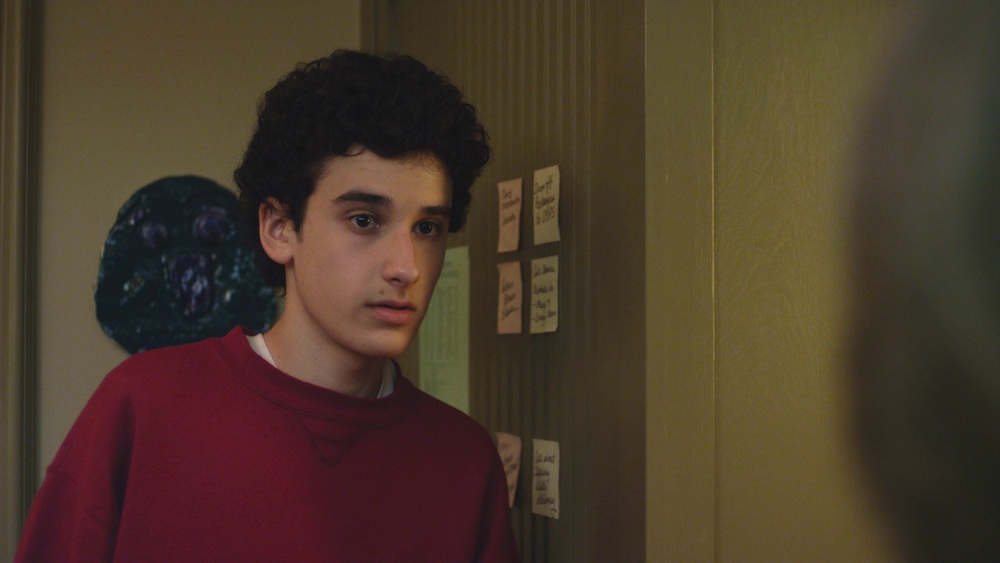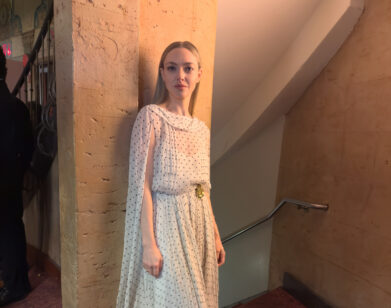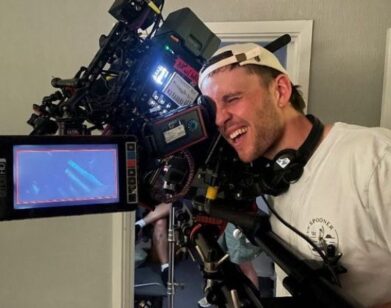Discovery: Ben Konigsberg

ABOVE: BEN KONIGSBERG AS CLARK IN QUITTERS.
“I feel like with any film—I haven’t had that much experience—you can’t possibly know if you’re succeeding at all times. Sometimes you’re in the dark,” says Ben Konigsberg, whose first major role is in writer-director Noah Pritzker’s indie drama Quitters. Konigsberg’s greenness isn’t apparent: he portrays the ultra confident, corrosive high schooler Clark Rayman, whose insufferably prying questions range from horrifyingly personal to comically aloof.
The film begins with Clark’s affluent San Francisco family falling apart. His mother (Mira Sorvino) has a breakdown and is sent to rehab, and it doesn’t help when his distant father (Greg Germann) attempts to provide emotional support. In turn, Clark runs off and moves himself into his girlfriend’s (played by Morgan Turner) house, causing all those involved great discomfort and suffering. “I related to him shutting himself off and removing himself from less than ideal situations, just running away,” Konigsberg tells me over the phone. “But do I relate to his treatment of people? No! Absolutely not. It goes against everything I stand for.”
Nevertheless, Konigsberg finds a way to make Clark compelling and even sympathetic. His insensitivity may be appalling, but the youthful vulnerability that underscores his performance is immediately familiar.

AGE: 20
HOMETOWN: I’m from all over. I was born in Portland, Oregon. Then I moved to London, England. For middle school and high school I lived in New York. Now I’m going to college in Los Angeles. I’m studying Film Production at USC.
CINEMATIC FAMILY: My grandma was an actress and so was my grandfather. [He was also] a lighting designer for theater in San Diego, California, and New Orleans for a long time. My mom was an executive producer for Walt Disney. I’ve always grown up with film and grown up with stories of my grandparents. My mom studied acting in school and she inherently understood the pull movies can have, and why people might be interested in it. I think maybe she saw a little bit of her own interests in my interests. Both of my parents were very supportive of me wanting to act, and so is my brother.
FIRST ACTING EXPERIENCE: I told my mom I wanted to audition for something and I got a role. I was nine years old in London in this film called The Christmas Miracle of Jonathan Toomey [2007]. I really had no idea what I was doing. That’s not to say I do now! I was a really chubby little kid. I played kind of the comedic relief in this story I believe at the turn of the 20th century in America I felt involved and that I had some purpose. I was definitely in the woods on that one, not exactly sure what I was doing at the time but I liked it enough to keep doing it. [laughs]
EARLY FILM WATCHING: I love Paul Thomas Anderson. I actually saw Magnolia [1999] when I was young. I think I was 10 or 11. I thought it was amazing but I had no idea why. That basically remains my favorite film of all time. I was also obsessed from a really young age with this film called The Court Jester [1956] with Danny Kaye, [the guy] from White Christmas [1954]. I had this bright idea to do what he did. I don’t know if I thought that meant being silly or whatever. [laughs]
ACTING IDOLS: I really like these—I don’t know if this is the right phrase—”journeyman” actors. I think Sam Rockwell is one of a kind. I think he’s extremely underappreciated. I love how vocal he is about constantly training and constantly learning. There was a podcast he did back in April with Marc Maron. He seeks out help and he does it all the time. For someone who is so accomplished, to think he might be working with an acting coach right before he starts a film—it’s not something I think about when I think of Daniel Day-Lewis, who is obviously incredible. Richard Jenkins is another [actor] I’m a huge fan of. I haven’t done much theater but I love going to see plays.
Living in New York I’d try to go to Broadway [shows] as much as I could. Right now I would definitely say Mark Rylance [is a big inspiration]. He’s pretty incredible. It was sort of how I felt with [the band] Fleet Foxes. When everyone started hearing about them I feel like I had been listening to them for a long time. It’s the same thing with Mark Rylance. He’s been on stage and been taken for granted and now that he’s in all these Steven Spielberg films people are like, “He’s amazing!” He’s always been amazing.
Another actor is Anton Yelchin. I definitely am in love with his career, which was cut tragically short. He’s an amazing, amazing actor. In line with Quitters, his performance in Alpha Dog is the definitive teenage performance. I still feel that. He was a great actor, someone who I definitely admire. There was a lot of variety in his performances.
GETTING INVOLVED WITH QUITTERS: It wasn’t an open call, but there was an audition I got sent. I just got a side, not the whole script. I went in and read for casting director Doug Aibel in New York, where I was living at the time. I got a callback, and I got a few more. I started to read with Morgan Turner, who plays Natalia in the film. She’s great. I went in five or six times in New York. It was pretty exciting. I wasn’t really sure what they thought. Noah [Pritzker] and Doug are really nice guys. I still think they were making the decision for themselves. It was pretty nerve-wracking too. I would never say going into an audition is the most fun thing or I ever feel totally comfortable with what I’m doing. That doesn’t mean the people you’re acting in front of aren’t really nice or supportive.
CLARK’S CHARACTER: He’s an extremely off-putting character. He’s sort of like the teenage version of Donald Trump. He’s pushy, he does what’s best for himself, he thinks he knows everything, yet slowly he’s making himself into a pariah. Honestly what most interested me is that he doesn’t understand social cues rather than he’s ignoring them. He’s really relaxed and conversational, thinking he’s an adult. He does a lot of social posturing. He has this very aggressively natural air about him. He’s his own worst enemy. By the end of the film he does everything that’s wrong for him and everyone else, but he thinks he’s in the right.
Noah Pritzker in interviews has talked about the film saying when you’re a kid you feel like you can shut yourself off and run away when things are not working. I guess what I responded to is that I’ve done that before and it doesn’t yield anything good. For me, reading the script and then acting the film and getting it made, its about that push and pull between personal deservedness and beneficial confrontation—owning up to your own and other people’s faults.
MAKING CLARK SYMPATHETIC: There had to be a little bit of—not despair—but you had to understand where he’s coming from. It would have been a mistake if you didn’t understand him or want him to succeed somewhat despite all of the terrible things he’s done in the movie. I tried to not hate myself too much when I was reading the lines, especially with some of the worst stuff he does. I guess I didn’t take myself too seriously, and tried to be relaxed and conversational and natural, and not feel like what I was saying and what I was doing was terrible. In some way that may help the audience sympathize with Clark a little bit. The people around him are very accommodating, and he’s not. He just ingratiates and imbeds himself into people’s affairs, to increasingly horrific effect and diminished results. I couldn’t be too much of an asshole, in an inelegant way of saying it.
ACTING AS A TEENAGER: Noah and Ben Tarnoff have worked together and written scripts. They grew up in San Francisco in the same kind of world. They knew what was up, but sometimes Noah—he was 26, 27—would have questions like, “Do kids say this? What seems right and natural?” Minor details and little adjustments here and there.
The characters are more realistic teenagers than you see in a lot of films, which was refreshing. It’s kind of weird to act out the things you’re experiencing in life as you’re experiencing them. You fall in love with someone or get in a relationship, and on the set of the movie you have to go back to that. It’s odd. I definitely was conscious of that.
PLANS FOR THE FUTURE: I write a lot. I’m mainly focusing on school now. I have two more years left. I’m about to go through my junior thesis and then getting my degree. No acting projects as of now. I’m doing all of it as it comes along and going with the flow.
QUITTERS COMES OUT TOMORROW, JULY 22.






